COMING TO AMERICA
Bernardo Martinez Cordova arrived in the U.S. a decade ago when he was 23 years old. He hoped to create a better life than he would have had picking sugarcane in Veracruz. He hoped to send money home to his parents and six siblings.
“My plan was to only stay for two years, just work, and I wanted to go back to my country and be with my family,” Bernardo explains in a soft voice through an interpreter. He speaks only Spanish.
After a harrowing week crossing the desert in sizzling temperatures he landed in Tucson, Arizona and immediately caught a bus to San Francisco. His wallet was almost empty.
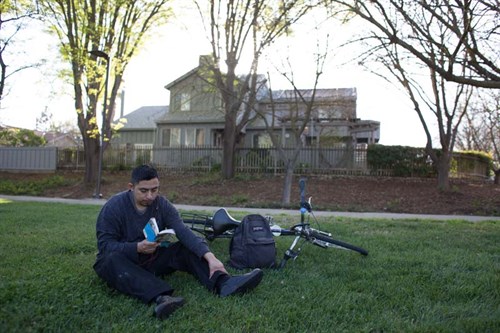 Bernardo Martinez Cordova doesn't drive. He waits in a park for hours between his two restaurant jobs. In his free time he calls family in Mexico and studies an English phrasebook that his partner, Kara, bought for him. Andrew Nixon / Capital Public Radio
Bernardo Martinez Cordova doesn't drive. He waits in a park for hours between his two restaurant jobs. In his free time he calls family in Mexico and studies an English phrasebook that his partner, Kara, bought for him. Andrew Nixon / Capital Public Radio“Everywhere there’s people who falsify social security or green cards, so you can get that anywhere, and those are valid because employers accept them,” Bernardo recalls.
He paid a friend $80 to help him create false papers. Within three days he was washing dishes for minimum wage at a crepe restaurant in the Castro.
“It’s easy to start working because I knew people from my hometown who lived in San Francisco so I asked them if they knew about a job,” says Bernardo. “So, one talks to another and they just recommend you and they help you get a job really quickly. It’s not hard.”
At first he was surprised that all of his co-workers in the kitchen had also entered the country illegally. But, he says in a decade of working in California restaurant kitchens, he’s only met one co-worker who is a legal citizen.
The Pew Research Center estimates that about 28 percent of the country’s dishwashers are undocumented. However some immigration experts say that’s likely an underestimate because it is very difficult to track people who use false identification.
Bernardo was living in a Latino bubble. He continued to speak exclusively in Spanish. He shared a two-bedroom apartment with seven other immigrant men all of whom worked several jobs so they could send money back to their families in Mexico.
“I missed my town very much, and I missed the freedom and going out in my town and knowing everybody,” he sadly shrugs. “Here, you know, I would go to work and then straight back to my apartment and not talk to others (outside of work).”
Often he’d drag himself home at dawn after working a double shift. He’d curl up on the floor next to his exhausted roommates before doing it all again the next day.
LOVE IGNITES
The monotony of Bernardo’s new life in the U.S. was interrupted when he met Kara. She’d dropped out of college after a year and took a serving job at the restaurant. He says she had a kind disposition and looked older than her years.
One night he tried to talk to her.
“I had a Mexican music station on and she came to drop some dirty dishes,” Bernardo says. “And I noticed that she liked the music, and I started joking around and I tried to ask her out, but I don’t think she understood.”
“He couldn’t communicate with me or anything, I tried to tell him my name,” explains Kara. “My name is Kara, Kara. Then I would point at him and he would touch his face because he thought I was trying to indicate that his face was dirty. (cara means ‘face’ in Spanish) So we couldn’t even – exchange names,” Kara laughs.
Kara would lounge in the restaurant’s kitchen long after her shift.
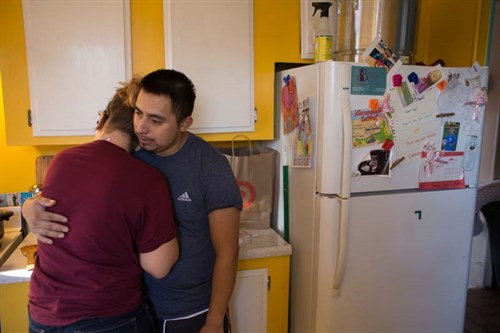 Kara Davis recalls flirting awkwardly with her partner, Bernardo Martinez Cordova. “My name is Kara, Kara. Then I would point at him and he would touch his face because he thought I was trying to indicate that his face was dirty. (Cara means ‘face’ in Spanish) So we couldn’t even – exchange names." Andrew Nixon / Capital Public Radio
Kara Davis recalls flirting awkwardly with her partner, Bernardo Martinez Cordova. “My name is Kara, Kara. Then I would point at him and he would touch his face because he thought I was trying to indicate that his face was dirty. (Cara means ‘face’ in Spanish) So we couldn’t even – exchange names." Andrew Nixon / Capital Public RadioThe two flirted awkwardly for months through hand gestures because neither spoke the other’s language.
“Then one night I had a dream that I was lost in a carnival and it was really terrifying,” Kara explains. “And then all of a sudden, I saw him (Bernardo) in my dream. And I was like is that the dishwasher? That’s the new dishwasher at work. I just felt this deep sense of like peace I guess and safety and I woke up with just like the best feeling and I was like that’s my man,” Kara sighs treasuring the memory.
Kara was surrounded by Spanish-speaking kitchen workers. Gradually she picked up the language.
“I think I was the only person that didn’t speak Spanish (in the restaurant) and so it was kind of like an immersion experience.” Kara immersed herself more and more into her growing Latino community. “But when I got pregnant, I was like well, this is a terrible situation because he’s (Bernardo’s) going to go back to Mexico and I certainly don’t want him to stay here just because I’m pregnant. To navigate a world together seems too complicated.”
PAINFUL SEPARATION
Kara, now 22 years old, decided to move into her parent's home in Davis, California to give birth to her son Jaime Gabriel.
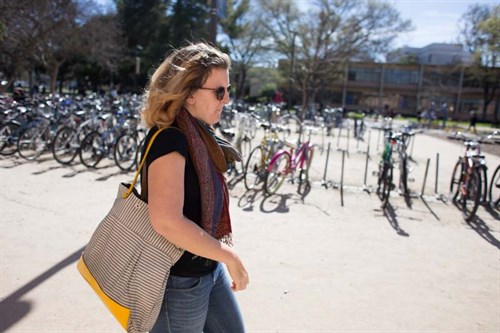 Kara Davis walks to her community development class at UC Davis. “It frustrates me to have to live with all the frustrating realities of someone who is living sort of in the shadows of this country, and then sit in class and be learning about all the reasons that it happened.” Andrew Nixon / Capital Public Radio
Kara Davis walks to her community development class at UC Davis. “It frustrates me to have to live with all the frustrating realities of someone who is living sort of in the shadows of this country, and then sit in class and be learning about all the reasons that it happened.” Andrew Nixon / Capital Public Radio“I decided it was better to move away, sort of like out of sight, out of mind, because I didn’t want him to decide to stay just because we had a baby together,” says Kara. “I knew I could be a single mom, and I thought he (Bernardo) was too gentle of a soul to be here.”
Bernardo was conflicted about their separation. He still dreamed of returning to Mexico, but the possibility of creating his own family tugged on his heart.
“It was a lot of emotion and excitement knowing that it was going to be a boy and I would think what if I stay, but what about my family?” Bernardo asked. “And then coming to terms that I might have to stay here, and what would happen? Would I ever see my family again?”
The young lovers longed for each other. After a year apart, Kara moved back to San Francisco. But they struggled to make ends meet in the expensive Bay Area.
“When she became pregnant the second time with Xóchitl, my daughter, that’s when I realized and I decided that I wanted to stay and be a family,” Bernardo recalls.
CULTURAL DIVIDES
Kara decided to finish her college degree. When she was accepted to the Community Development program at UC Davis the family moved to the town where Kara's parents live.
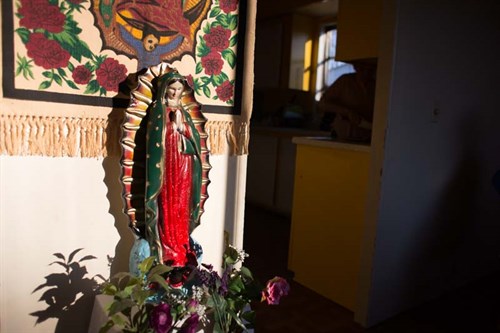 Bernardo Martinez Cordova is Catholic. Kara Davis is Mennonite. They are raising their children in the Catholic faith with Mexican traditions. Andrew Nixon / Capital Public Radio
Bernardo Martinez Cordova is Catholic. Kara Davis is Mennonite. They are raising their children in the Catholic faith with Mexican traditions. Andrew Nixon / Capital Public RadioThey bought a mobile home in a trailer park where other Latinos live. Their yard, like many of their neighbors', is strewn with brightly colored toys and tricycles. Again, Kara was surrounded by Mexican culture. The family painted the walls of their mobile home yellow, green and orange, placed statues of the Virgin Mary on the mantel and Bernardo hung up soccer jerseys from his favorite professional players.
Once again Bernardo was quickly employed in the kitchen of a Mexican chain restaurant. Six days a week, he leaves the house early, bikes to work and doesn’t return until long after the kids have gone to bed. But, he rarely complains about his fourteen hour days because he’s able to keep the family afloat.
The family’s bond grew stronger. Two years later, a third baby Esmeralda MariCruz arrived, but Bernardo’s illegal status undermined the stability of the couple’s foundation. Questions gnawed at them. Should they buy a house? Could they get married? Would Bernardo be deported?
INEQUALITIES EMERGE
Bernardo grew up with a culture with distinct gender roles. Here in the U.S., he often feels powerless.
“In my town moms usually just stay home and raise the children,” explains Bernardo. "And here both people in the couple, both parents need to work in order to have some financial stability.”
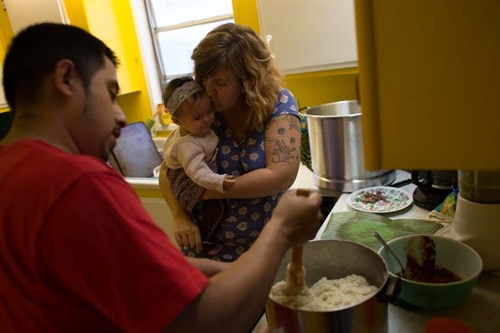 Bernardo Martinez Cordova and Kara Davis spend nearly every Monday together at home in Davis, Calif. It is the only day that both have off from work and school. Andrew Nixon / Capital Public Radio
Bernardo Martinez Cordova and Kara Davis spend nearly every Monday together at home in Davis, Calif. It is the only day that both have off from work and school. Andrew Nixon / Capital Public RadioHe says it’s challenging to not only share fiscal responsibility with Kara, but also be unable to represent himself at the bank or the DMV.
“Wherever we go, in an official sense I have to be the one... I’m the one who gets a lease for an apartment; I’m the one who gets a loan for a car,” says Kara. “In this case, the title for our home, the trailer, is in my name. I mean that’s a heavy… that’s an uncomfortable thing in a relationship that’s supposed to be equal, and I think that makes him insecure sometimes.”
On the other hand, Kara was raised with progressive American parents who value equal roles. She says she would be embarrassed to tell her friends or family about the inner dynamics of her relationship.
“My friend was visiting last week and I was in the kitchen cooking and Bernardo was sitting here watching TV and he was like, ‘Oh, the baby needs a clean diaper.’ So, then rather than stop watching TV and change the diaper, I’ll leave what I’m doing in the kitchen to go change her diaper. I wouldn’t take it from an American guy.”
Each morning when she lays out Bernardo’s clothes for the day, she justifies her actions to herself. She knows it's hard for him to be so far away from Mexico. But, she pays a price, after she’s finished cleaning up dinner and put the kids to bed, she often falls asleep hunched over her school books.
FEET IN TWO WORLDS
“It frustrates me to have to live with all the frustrating realities of someone who is living sort of in the shadows of this country, and then sit in class and be learning about all the reasons that it happened,” the pitch of Kara’s voice rises as she explains how she feels like she’s caught between two worlds.
In her University lectures she’s learning about the economic inequalities of low-income communities like her own.
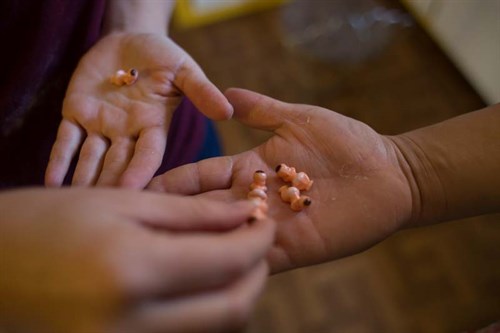 Kara Davis prepares a traditional Mexican king cake to celebrate Three Kings Day. It's considered good luck to receive the slice that contains a plastic baby. Andrew Nixon / Capital Public Radio
Kara Davis prepares a traditional Mexican king cake to celebrate Three Kings Day. It's considered good luck to receive the slice that contains a plastic baby. Andrew Nixon / Capital Public Radio“Last year our trailer wasn’t even waterproof and it was raining,” says Kara. "And I’m like I’m going to school and discussing these things (income inequalities) theoretically and then I’m coming home and putting the pots out for my water and I’m worried about my husband getting deported.”
She says the isolation of her life can bring her to tears. She struggles to relate to both her middle-class white classmates and her Latino neighbors. It's tough to know what to say to her young son about his father's illegal status.
“I have to explain to my six-year-old why immigration could come and deport his dad,” she says. “And to explain it, it sounds like oh, he’s breaking the law and he did all these things wrong. But I’m sitting in class hearing the reasons why it (people crossing the border) came to play.”
BUILDING A LIFE ON A SHAKY FOUNDATION
Deportation is a constant threat. Yet Bernardo and Kara keep stepping forward. They know their situation could be worse.
“I’ve been here for ten years and if I ever had the bad luck of getting deported I know that in my case I’m fortunate enough that my wife and my children would be able to come in and out of the country. They could visit me,” says Bernardo. “There are other people, other couples, that they wouldn’t have the same luck because both of them are undocumented. They would just be a family torn apart.”
Bernardo refers to Kara as his wife, although the two are not legally married. Family and friends often ask the couple why they don’t get married to gain legal status for Bernardo. But the couple is scared to even try.
Applicants for legal status who enter the country illegally must attend their final application interview at a U.S. consulate in their native country. If Bernardo’s application were to be denied he risks being banned from entering America for ten years or more. Plus, the couple says that the application process can be very expensive and they don’t have the extra funds. They’ve decided it’s better to hide in the shadows than be forced apart during their children’s formative years.
“The problems in our relationship are justice problems. They’re issues on a bigger scale than us and we can be united against them, they’re not problems between us.” smiles Kara.
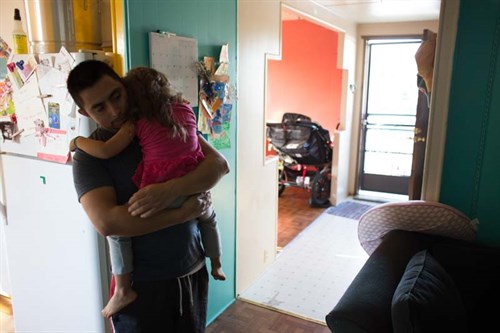 Bernardo holds his middle child. "When Kara became pregnant the second time with Xóchitl," Bernardo says, "that’s when I realized and I decided that I wanted to stay and be a family." Andrew Nixon / Capital Public Radio
Bernardo holds his middle child. "When Kara became pregnant the second time with Xóchitl," Bernardo says, "that’s when I realized and I decided that I wanted to stay and be a family." Andrew Nixon / Capital Public RadioPlus, Bernardo says he’s willing to make sacrifices for his children.
“There’s more of a future here for our children. In Mexico, quality public education is not available.”
Kara says she never imagined the challenges she would face when she fell for an undocumented dishwasher more than a decade ago.
“On a day when I’m feeling more positive about things, I would say that gives me the opportunity to walk in both worlds as opposed to not fit into either world.”
Each night the family cuddles on their couch before bedtime for Catholic prayers.
Jaime climbs into his father’s lap and slowly recites bible passages in Spanish.
“Nombre del Padre, del Hijo, del Espíritu Santo. Amen.”
The small boy asks God to protect each family member.
“Esta noche, te pido por mi mamá. Por mi papá. Mi hermana Xóchitl. Esmeralda. También te pido por las personas que no tienen qué comer. Que no tienen dónde vivir. Que pasan fríos en estas noches.”
When Jaime looks up to his father for approval, Bernardo explains the prayers, speaking through an interpreter.
“Sometimes we think that we are the only ones who are suffering, and that we are suffering a lot, but in reality we are not. There are others who are suffering more than we are. Others have less to eat, or may not be physically well.”
The parents carry their three small children into a bedroom with turquoise walls. Kara gently places 9-month-old Esmeralda into a crib. Bernardo tucks both Xóchitl and Jaime into a twin bed together. Kara and Bernardo tip-toe out of the room. They hope the foundation they are building for their family won’t suddenly crumble under them.